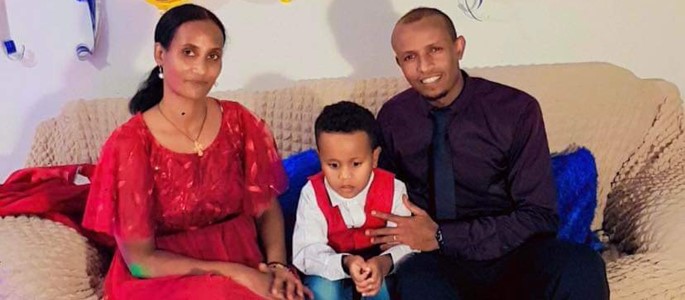Danish authorities separated Misghinna and his family for 8 years
A stubborn legal battle finally paid off after waiting for far too long, and led to a change in practice for all refugee families with children
This article is a follow-up to an article on the same case from 2018.
Misghinna arrived in Denmark in 2015 and was granted asylum because he had been called up for the inhumane, indefinite military service in the dictatorship state of Eritrea. The year before, he had married Selam, his fiancée of several years, and she was pregnant when he embarked on the long, life-threatening journey with people smugglers through the scorching Sahara desert and on an overcrowded boat to Europe. Misghinna traveled with his best friend, but the friend did not survive the trip through the desert.
Misghinna's wife gave birth to a son while he was living in the asylum center on Samsø, and he was quickly granted asylum – everything now looked promising, and they were looking forward to being reunited soon. But shortly afterwards he received terrible news: the son had died, only a month after birth. Misghinna was devastated, but set about learning Danish and quickly found a job. Selam soon after fled to neighbouring Ethiopia, where Misghinna visited her. But after two years of waiting, the couple was refused family reunification and turned to Refugees Welcome for legal help. We brought a long article about the case, where you can see more photos of the young couple.
It was not until August 2023 that the family was reunited in Denmark, after 8 years of separation and a constant legal battle, which even led to a change in practice for all refugee cases with children. The 5-year-old Abiesolom can now finally live with his father for the first time. And a number of other children can grow up with both their parents after this case changed practice.
”Today is the day that my family and I got relief and happiness, under your endless support!"
- message from Misghinna to the undersigned on the day they got the permit
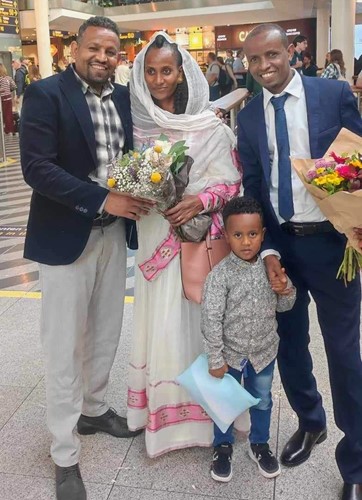
Wife and son just arrived in Kastrup airport
Great costs
For the past several years, Misghinna has paid rent for a 3-room apartment in Køge, so that there was room for Selam and Abiesolom when they came. But he also had to pay for a one-bedroom apartment in Addis Ababa while they were still there. He also supports his father and sister in Eritrea. Misghinna has visited his wife six times, and each time he has had to apply and pay for visas and ask for extra time off from work. For the past six years, he has had the same job as an office and warehouse assistant at Salling Group, at night. The night shift provides a better wage, but is, on the other hand, hard on your health. Fortunately, the family has received legal help free of charge from Refugees Welcome and retired lawyer Jørgen Franck; Misghinna had been unable to pay for a lawyer.
”If I didn't have my strong faith in God and my good job, I wouldn't have succeeded. At times I have been very down. My wife has always believed in me and that it would work out”
The rejections and the waiting time have been hard for the whole family. At times, Misghinna has been depressed and frustrated, and had difficulty concentrating on language school and work. He found it hard to understand why the Danish state would accept him, but not his wife – without her, his life was meaningless.
Misghinna has helped over 10 other Eritrean couples fill out forms and has explained to them the process of getting married in Ethiopia. They were all granted permission several years ago, but his own case has dragged on longer than any other case.
”We know another family in a similar situation, and they got permission shortly before us. On the one hand, it made us believe that we would succeed, but at the same time it was frustrating: why not us?”
The rejection from 2017
The reasons for the refusal were the following:
• since the marriage [...] cannot be recognized under Danish law,
• since [the couple] have not had a fixed cohabitation of longer duration and
• as there are no very special reasons for issuing a residence permit.
Under the last justification, the following was stated: "(...) that you do not have children together. (...) We note that the fact that you have stated that you were pregnant and that you lost your son when he was 35 days old does not change our assessment."
Refugees Welcome submitted a complaint to the Immigration Appeals Board in November 2017, but the rejection was confirmed one year later. In the meantime, the couple had remarried under the Ethiopian authorities and Selam had given birth to the couple's second son, Abiesolom, on November 1, 2018, who was thankfully healthy.
Valid marriage
Over the years, Refugees Welcome has argued stubbornly that the Danish authorities were wrong on crucial points in the Eritrean family cases, where many refusals were given compared to other refugee groups. We submitted a long memo on the subject in 2017 as well as a substantial number of complaints in the individual cases, where we also pointed out similarities and differences.
According to Danish law, a marriage must basically be approved if it is valid in the country where it was entered into. Refugees are exempt from having to meet other criteria, since they have a legal claim to family reunification. However, we never managed to get the Danish authorities to recognize marriage certificates from the church, which are otherwise fully recognized in Eritrea. Few Eritreans have ever seen the civil certificate which the Danish authorities require, and it is virtually impossible to obtain after leaving the country illegally.
Since all the spouses of the Eritreans residing in Denmark had to flee to a neighbouring country in order to identify themselves and pick up a possible permit at a Danish embassy, it became customary for the couples to remarry when the resident traveled down to visit his spouse – in Ethiopia, Sudan, Uganda or Kenya. These certificates were easier to get recognized. In periods, however, certificates from Ethiopia have also been the subject of many discussions between the Danish Immigration Service and Refugees Welcome, e.g. because a batch of pre-printed certificates from the Ethiopian authorities with a spelling error were deemed fake. At the time of writing, there is still a dispute over which stamps from various offices in Addis Ababa make a certificate valid.
Misghinna and Selam were one of the first rejected couples to remarry in Ethiopia, and their certificate with various stamps from the Ethiopian authorities is exactly identical to certificates that many other couples have been approved by the Danish Immigration Service. But in this case, it was never accepted that they had entered into a valid marriage.
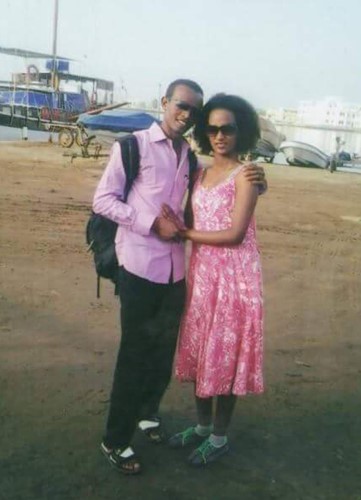 The couple on a vacation while they were engaged to be married, 2014
The couple on a vacation while they were engaged to be married, 2014
Cohabitation
Misghinna and Selam had only lived together for 5 months after their wedding in Eritrea before he had to flee the country. As a rule, approx. 18 months of cohabitation is required as an alternative to a valid marriage. Shorter and therefore insufficient cohabitation is often due to the fact that military service or national service forces couples to live separately, as well as the fact that in a deeply religious society like Eritrea you do not move in together before marriage. But this couple had been dating since 2012, got engaged in 2013 and married in 2015, after which they had a child together – it was very much an established family life, which we documented with videos and photos of the couple from ceremonies and private situations. In another case from 2019, Immigration Appeals Board agreed with us that forced military service could constitute an involuntary separation of a couple.
Shared children led to a change in practice
Misghinna and Selam understandably perceived it as a slap in the face when their first child did not count in the assessment of family life because he died. But not even the birth of the second child could change the assessment. As in many other cases, the couple was given the completely unreasonable message that the child was welcome to come had to stay – the family was treated in the same way as a divorced couple, or two people who had a child without having a relationship with each other. We argued in vain in all the cases that, according to the Convention on the Rights of the Child, a child has the right to have contact with both parents, which is impossible if one lives in Denmark and the other in a refugee camp in Ethiopia. Several couples chose to bring the child here, which had great costs for the whole family. Read about Tkabo's case here (in Danish).
However, that assessment was reversed many years later and the general practice was changed on the basis of Misghinna's case. The Immigration Appeals Board decided in December 2022 that he had actually established a family life with Selam in the light of the following facts: they had committed to each other at a wedding ceremony, they had decided to have a child together, and he had assumed paternity and economic support. Subsequently, the Board has returned similar cases to the Danish Immigration Service with a message to grant permission with reference to this case. In general, the board has chosen a less restrictive assessment of ECHR art. 8 over the last year than previously.
 Exempt from another case, referring to Misghinnas case.
Exempt from another case, referring to Misghinnas case.
Long process, unreasonable waiting times
Misghinna's case was strong compared to many others: it was well documented in the form of certificates and photos, the couple had known each other for many years, Misghinna had kept in close contact with Selam, and he applied immediately. Misghinna even had his religious marriage confirmed by his local municipality office in Eritrea with the signature of four witnesses – something that posed a risk to witnesses and his family members. He is also resourceful: speaks English well and learned fluent Danish, quickly found work and has been able to support his family and travel to Ethiopia as often as he could get time off from his job.
He has not made any mistakes in the complicated application forms and he has had competent legal assistance throughout. Refugees Welcome ran the case from 2017 to 2020, where we, among other things, persuaded lawyer Eddie Khawaja to apply for free trial in the courts, which was refused. The retired lawyer Jørgen Franck took over the case in cooperation with us, as we had gradually become worn down, and he also complained about the administrative errors from the authorities’ side. He also approached the Ombudsman who agreed that the waiting time at the Immigration Appeals Board in both this and a number of other cases was unreasonably long – over two years.
For eight years, the case has been constantly under consideration in various offices. Several new applications have been sent to the Danish Immigration Service as well as several applications for reinstatement, two complaints to the Immigration Appeals Board and supplementary submissions, as well as inquiries to the courts and the Ombudsman. The response to the first application to the Danish Immigration Service took a year. The second complaint to the Immigration Appeals Board also took a year, but the next one took over two years. The supposed processing time was 10 months, but after that we received a new letter every two months with a postponement of the response time – in the end more than two years had passed. Along the way, this case was overtaken by other complaints that we had filed later – despite the office claiming to settle the cases in the order in which they are received.
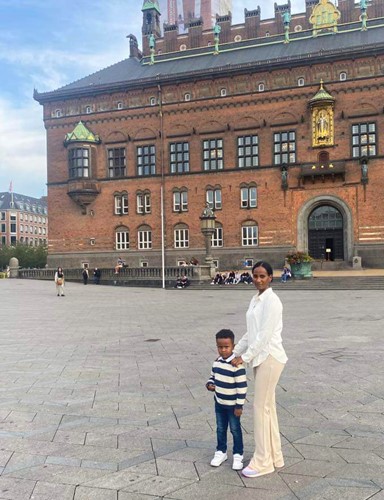 Abiesolom and Selam visiting Copenhagen
Abiesolom and Selam visiting Copenhagen
Waste of resources
The permit, which the Immigration Appeals Board finally reached in December 2022, is based on the couple's actual established family life according to ECHR article 8, which was otherwise rejected several times by the same bodies. The valid marriage certificate from Ethiopia was dismissed in this case, despite the fact that other – completely identical – certificates were approved for other couples.
The case is one of many examples of an unnecessary waste of resources, when the immigration authorities repeatedly refuse and invent new obstacles, but in the end have to bow to persistent lawyers. In this case, the immigration authorities have burdened the state budget and extended the waiting time for other cases, Refugees Welcome's legal counsellors and two lawyers have spent many pro bono professional hours, and the family has had many financial expenses along the way.
But the real scandal is that three people have lived many years in constant stress and have been separated from each other in daily life, despite the fact that they had a right to be reunited as soon as possible according to human rights conventions.
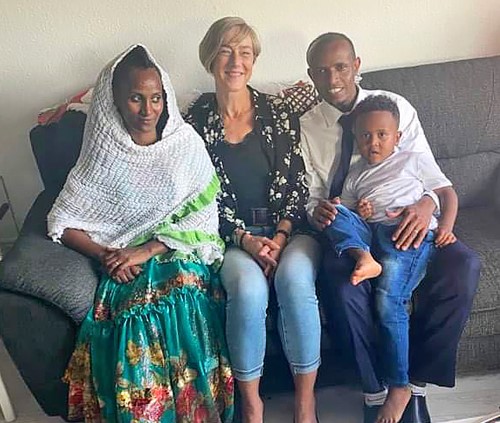 The author to this article visiting the family shortly after arrival
The author to this article visiting the family shortly after arrival
Without support from our members we would not have been able to help Misghinna and change the practice. Become a member today!


